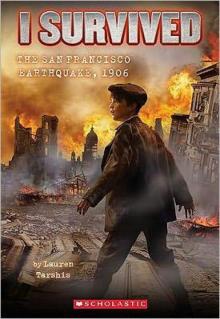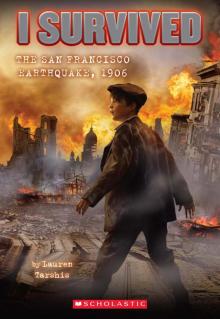- Home
- Lauren Tarshis
Emma Jean Lazarus Fell in Love Page 2
Emma Jean Lazarus Fell in Love Read online
Page 2
Emma-Jean watched her peers with keen interest throughout the afternoon. Wherever she looked, girls were huddled in whispering conferences, plotting their Spring Fling strategies. Boys who ventured too close were waved away with sly smiles and gentle chiding.
“No you don’t!”
“Girl talk!”
“Hey! Top secret!”
When the girls were ready to issue their invitations, they did so with surprisingly little ceremony. A few of the bolder types simply walked up to their quarries in the hallway and blurted out, “Want to go to the Spring Fling with me?” over the noise of slamming lockers and squeaking footsteps. It was in this manner that Kaitlin invited Neil Messner, who accepted with a blushing nod as his friends slapped him on the back.
More bashful girls used their friends as intermediaries; Michele hid outside the teachers’ lounge while Valerie and Kaitlin cornered Leo Daniels in the doorway of the band room. He was clearly delighted with their message, though in his excitement he dropped his bass, which barely missed Valerie’s foot.
Emma-Jean found the scene fascinating yet perplexing. It was as if an enchantress had stepped out of one of the fairy tale volumes in the library and waved her wand over the seventh-grade wing. Of course Emma-Jean didn’t believe in anything as fanciful as fairies or magic spells; she was firmly grounded in modern scientific principles. But clearly there were mysterious forces at work. Even the teachers took notice.
“What’s gotten into these kids!” she heard Mr. Petrowski saying as she rounded the corner between classes. “They’re out of control.” He was speaking to Ms. Wright, Emma-Jean’s esteemed language arts teacher, who was filling her thermos at the water fountain.
Emma-Jean hung back, eager to hear Ms. Wright’s insights. Not only was her teacher one of her closest friends, she was one of the wisest people Emma-Jean knew. Earlier in the year, when Emma-Jean was still eating lunch by herself, Ms. Wright would often pull up a chair so that they could discuss a poem they had read in class, or to share a story from her childhood in the African country of Ghana, where the breezes smelled like roasting pumpkins and acacia flowers. Ms. Wright always had expansive views on important issues.
“Oh Phil,” Ms. Wright said, “love is in the air. These kids are like the birds and the bees. They’ve got spring fever. You remember what it was like to be young, don’t you?”
Usually Mr. Petrowski dismissed statements of this nature with a jowly frown and wave of a beefy hand, but now he looked wistfully into the distance.
“I guess I do,” he said.
Emma-Jean was intrigued by Ms. Wright’s hypothesis. She thought of the joyous song of the yellow warbler outside the science room and the bees buzzing sprightly among the lilacs. Perhaps this excitement among her peers was a seasonal phenomenon.
But then she had an alarming thought: Did she have spring fever too? Was it communicable, like pinkeye or an intestinal virus? Perhaps this explained the fluttering of her heart that struck whenever she saw Will.
She frowned, rejecting this notion. Unlike her peers, Emma-Jean was logical to her core, not easily carried away on emotional tides or flights of fancy. And after giving the matter some serious thought, she had determined that her friends were correct: Will was not a suitable match for her.
After all, she and Will had little in common. Unlike Emma-Jean, who had an impeccable academic record, Will was a mediocre student who spent most class periods drumming his pencil on his desk and exchanging bored looks with his friends. Unlike Emma-Jean, who had far-ranging interests including nature, poetry, and the study of Hindi, Will’s only passion was the sport of basketball, which Emma-Jean considered monotonous and excessively loud.
Then again, Emma-Jean and Will shared a special kinship. Earlier in the year, Will had helped Emma-Jean by throwing a pear at Brandon Mahoney when he was pestering her in the cafeteria. She in turn had come to Will’s assistance by solving a vexing problem involving Mr. Petrowski, his beloved Cadillac, and some missing chocolates. Will had been very pleased with the results of Emma-Jean’s efforts on his behalf. “I owe you one,” he’d said to Emma-Jean not long ago. He’d put his hand on Emma-Jean’s head and, like a king bestowing a title on a noblewoman, pronounced her “a good kid.” Perhaps this was not the most regal title, but it was obvious that Will held Emma-Jean in high regard.
Emma-Jean puzzled over the issue of Will Keeler throughout the afternoon. It was like a complex algebra problem, with hidden integers and variables Emma-Jean couldn’t quite grasp. Laura Gilroy was certainly part of the equation, though her value was hard for Emma-Jean to calculate.
Emma-Jean was quite sure that Will did not have any affection for Laura.
He dodged her in the hallways and ignored her flamboyant dance displays on the blacktop. Most striking of all was a dramatic scene that Emma-Jean had surreptitiously witnessed at the last seventh-grade dance. Emma-Jean had stepped out of the girls’ room to discover Will and Laura standing together in the deserted hallway. Emma-Jean had concealed herself in an alcove and observed the scene undetected.
“So you have to dance with me,” Laura had said.
“I don’t dance,” Will had said.
“Not even with me?” Laura had asked in an odd, babyish voice.
“Gotta go!” Will had said, rushing away and leaving Laura to mope outside the girls’ room.
Oddly, none of this had dampened Laura’s ardor for Will; as recently as yesterday, she had reaffirmed her plan to invite him to the Spring Fling.
“I’m just waiting for the perfect time to ask,” she had said to Emma-Jean’s friends, casting her proprietary gaze across the blacktop to where Will was playing basketball with his friends.
Emma-Jean now tried to imagine how Laura would react if another girl asked Will to the dance. The image that came to mind—a snarling dog—caused Emma-Jean to blink.
No, it would not be prudent to ask Will to the Spring Fling. In fact, she should put Will Keeler completely out of her mind.
But after the final bell had sounded, Emma-Jean found herself standing outside Will’s social studies class. She followed him down the hallway and to his locker, mesmerized by the reflection of the afternoon sun on his golden hair. He looked surprised when he turned and discovered her standing behind him.
“Hey, Nancy Drew,” he said. He often flattered her with this reference to the fictional detective, whose powers of observation and analysis were almost as keen as Emma-Jean’s.
“Hello,” said Emma-Jean, her mouth strangely dry despite the drink of water she had taken just minutes before.
“Heading to a meeting of the genius club?” said Will.
“I was not aware that there was such a club at our school,” Emma-Jean replied.
Will laughed and patted Emma-Jean on the head.
“You’re hilarious,” he said, waving good-bye as he jogged away.
Emma-Jean had not meant to be humorous—hilarity was not in her nature. But it was gratifying to make Will smile. She followed behind him, her scalp tingling from his touch, her ears echoing with his pleasing laughter.
She stood at the windows, her heart beating with alarming vigor, and watched as Will jogged to the pickup lane and hopped into his father’s truck. She waited as the truck sped away, and then stood there for a few moments more, her hand resting lightly on her head, her eyes glued to the place on the pavement that Will’s sneakers had last touched.
Chapter 4
Why did everything good turn bad? That was the story of Colleen’s life.
Maybe she should write a song about it, which would go something like this:
Everything good turns bad . . .
And then I get really sad.
La, la, la
La, la, la
The song was playing in her head during fourth-period Spanish when Colleen took a bathroom pass and went to flush her note down the toilet. She was standing there in the girls’ room stall, all set to send the note down the drain. But then she remembered
when Brandon Mahoney tried to flush his Benedict Arnold report (he’d gotten a D) and there was a flood and he got in huge trouble. That’s all Colleen needed, for her note to float down the hallway for everyone to see, and besides, that wouldn’t be fair to Mr. Johannsen, who would have to mop up the mess.
No, flushing wasn’t the right thing to do.
She should just throw it away.
Or . . .
She could keep it.
Colleen wasn’t sure.
Because even though Colleen was positively absolutely certain that Emma-Jean had written the note, there was, buried deep in her heart, the idea that maybe a boy had actually written it. That was how it always was with Colleen: No matter how sad she felt, there was always this little bit of hope—like a speck of glitter caught in your eyelash—that never went away, no matter what.
It was that tiny sparkle that made Colleen put the note back in her pocket. She kept it there for the rest of the afternoon, her secret. At the end of the day, she was supposed to go to math extra help with her friends. But instead Colleen went looking for Emma-Jean. She looked in Emma-Jean’s usual hangouts, Ms. Wright’s room and Mr. Johannsen’s workshop and the dictionary table in the library. Finally she found her in the front lobby, staring out the windows with this fascinated look on her face, like a herd of zebras was galloping through the parking lot.
“Hey!” Colleen called, hurrying over.
“Hello,” said Emma-Jean in her usual voice, like she wasn’t so thrilled to see Colleen, even though Colleen had learned that this was just Emma-Jean’s way, and it didn’t mean anything at all, or anything Colleen had to worry about.
“Um . . . Emma-Jean . . . I have to ask you a question. Don’t be surprised because it’s a little . . . odd.”
“I will not be surprised,” Emma-Jean said. “You often ask me odd questions.”
Colleen had to admit this was true. Like just that morning in language arts, they were reading about Cyclops, the Greek mythology monster with the one huge eye, and Colleen had leaned over to Emma-Jean and whispered, “Don’t I look like Cyclops?” because that morning she had woken up with the biggest pimple smack in the middle of her forehead.
She was trying to be a little funny, but Emma-Jean had stared at Colleen for what seemed like forever and then said, “Oh yes, I now see what you mean about your blemish,” in her usual serious voice, which wasn’t what Colleen had in mind, but what did she expect?
Colleen unfolded the note, took a deep breath, and handed it to Emma-Jean.
“So, I got this yesterday,” Colleen said. “I found it in my locker. And well, I’m just wondering, did you write this, Emma-Jean?”
Emma-Jean read the note and handed it back. “No, of course I did not. My handwriting looks nothing like that.”
“You didn’t?”
“No,” Emma-Jean repeated.
“Are you sure?” Colleen said, putting her hand on her chest because a heart attack was a definite possibility.
Emma-Jean frowned a little. “Quite sure.”
Colleen threw her arms around Emma-Jean, but then let go right away because Emma-Jean wasn’t the huggy type.
“Oh my gosh, Emma-Jean! You know what this means? That a boy likes me! Don’t you think that’s what it means? That he likes me? And he wants me to know it? And, well, the Spring Fling is coming up and I think maybe he wants me to ask him!”
Emma-Jean looked out the window and didn’t say anything. For a second Colleen thought Emma-Jean had forgotten all about her, that her mind was off thinking about something Emma-Jean-ish, like tree bark or soup.
But then Emma-Jean looked back at Colleen. “Your theory is logical.”
“It is?” Colleen said, not caring that her voice was all squeaky.
Emma-Jean nodded.
Colleen wanted to do a round-off back handspring, back handspring, back handspring, back flip down the hallway. But since she could barely do a cartwheel, she decided it was smarter to just jump up and down some more.
Out of all the girls in the seventh grade, a boy liked Colleen.
Colleen, who wasn’t the prettiest girl in the seventh grade, or the smartest, or the funniest; Colleen, who wasn’t first violin or in high math or travel soccer. A boy liked Colleen, because she was Colleen, because that was enough.
Now all she had to do was figure out who he was. And that would be a cinch!
“You’ll find him for me, won’t you, Emma-Jean?”
“What did you say?” Emma-Jean asked.
“You’ll find out who wrote this? You’ll figure it out for me!”
Of course Emma-Jean would. Because Emma-Jean was a genius. And she was Colleen’s friend.
Colleen felt like singing.
Everything good doesn’t always turn to bad . . .
And I’m really, really glad.
La, la, la
La, la, la
Chapter 5
Colleen was speaking loudly, and leaning in so close to Emma-Jean that her daisy and bubble-gum scent tickled Emma-Jean’s nasal passages. Even so, Emma-Jean was quite certain she had misheard Colleen’s question.
“You are asking for my assistance?” Emma-Jean said.
“Yes!” sang Colleen. “I am!”
Emma-Jean studied Colleen closely. “Do you not recall what happened the last time I assisted you?”
Emma-Jean remembered, in painstaking detail, how just eleven weeks earlier she had discovered Colleen sobbing in the girls’ room, distraught over the news that she would not be joining Kaitlin and her family on an annual February ski trip to Vermont. For four consecutive years, Colleen had accompanied the Vogels on this trip. But this year, Laura Gilroy had used her considerable powers of manipulation to induce Kaitlin into inviting her instead.
Emma-Jean had attempted to assist Colleen. And her plan—carefully conceived and meticulously executed—had been successful. But it had triggered a chain reaction of unintended consequences: Laura had turned vengeful. Colleen had been overwhelmed by anguish. Emma-Jean herself had fallen out of a tree.
“Oh no!” Colleen said, waving her hand as if to erase the unpleasant images from Emma-Jean’s mind. “This problem is nothing like last time. This is so simple!”
Emma-Jean knew this could not be true. If there was one thing she had learned through her close studies of her peers, it was this: Nothing was simple in the seventh grade. The most routine interactions—a joke whispered in the bus line, an offhand remark about new sneakers, a request for gum in the hallway—could turn into dramas of Shakespearean complexity, with ruthless villains, sudden plot twists, and tragic endings.
Emma-Jean was fond of her fellow seventh graders. She believed that there was no finer group of young people than the 103 boys and 98 girls with whom she shared her school days. And she was particularly pleased to have her four new friends. But her peers were irrational, and as a result, their lives were messy. In the aftermath of her fall from the tree, Emma-Jean was more determined than ever to keep out of their problems.
She opened her mouth to explain this to Colleen. But then Colleen looked at Emma-Jean in a way that conveyed that she was not exactly asking for Emma-Jean’s help. Colleen was expecting Emma-Jean’s help, humbly, as a flower expects the sun to shine. Colleen’s eyes were wide open, filled with hope and trust. One did not often see such a look at William Gladstone Middle School.
Yet Emma-Jean had seen it before, when Colleen and Kaitlin and Valerie and Michele caught sight of each other in the crowded hallways and hugged hello and whispered their secrets. It occurred to Emma-Jean that it was this special trusting look—more than saved seats and beaded ankle bracelets or notes signed with hearts and exclamation points—that conveyed the strength of the girls’ friendship, the mysterious force that bonded them together.
Running footsteps could be heard in the hallway, and Kaitlin, Valerie, and Michele appeared around the corner.
“You won’t believe what I found in my locker!” Colleen called to the girls, ho
lding the note over her head.
The girls encircled Colleen, who held up the note for their eager eyes.
“Now do you get it? You are the best!” Kaitlin said, wrapping her arms around Colleen’s shoulders and kissing her cheek.
“You have a secret admirer! You have a secret admirer!” Valerie chanted, pumping her fist into the air.
The girls smiled and swayed as though Colleen’s happiness was their favorite song.
“But he won’t be secret for long!” Colleen said. “Because Emma-Jean’s gonna find him. Right, Emma-Jean?”
“Find him?” Kaitlin said.
The girls all looked at Emma-Jean, and she took a step closer to them.
“Yes,” Emma-Jean said. “I will find him.”
Chapter 6
Like a voyager returning from a faraway kingdom, Emma-Jean walked through the front door of her house with a grateful sigh. She enjoyed her time at school, but after the day’s excitement, she was relieved to return to the comforting rituals of her home.
She was greeted by a framed photograph of her father, Eugene Lazarus, which hung on the wall of the small entryway. He had died two years, six months, and two days ago, in a car accident on I-95. There was not a moment in the day when Emma-Jean did not miss him. But very often she could sense her father around her, his voice whispering in the wind, his shadow dancing behind hers on a sunny day, his sparkling green eyes smiling up at her from a fresh puddle of rain. She certainly felt him in every corner of this house. She reached out and let her fingers hover over his picture. As usual he seemed to give her a reassuring nod.

 I Survived the Battle of D-Day, 1944 (I Survived #18)
I Survived the Battle of D-Day, 1944 (I Survived #18) I Survived the Great Molasses Flood, 1919
I Survived the Great Molasses Flood, 1919 I Survived the Galveston Hurricane, 1900
I Survived the Galveston Hurricane, 1900 I Survived the San Francisco Earthquake, 1906
I Survived the San Francisco Earthquake, 1906 I Survived #4: I Survived the Bombing of Pearl Harbor, 1941
I Survived #4: I Survived the Bombing of Pearl Harbor, 1941 I Survived the Destruction of Pompeii, AD 79
I Survived the Destruction of Pompeii, AD 79 I Survived #1: I Survived the Sinking of the Titanic, 1912
I Survived #1: I Survived the Sinking of the Titanic, 1912 I Survived #5: I Survived the San Francisco Earthquake, 1906
I Survived #5: I Survived the San Francisco Earthquake, 1906 I Survived Hurricane Katrina, 2005
I Survived Hurricane Katrina, 2005 I Survived the Attacks of September 11th, 2001
I Survived the Attacks of September 11th, 2001 I Survived the Attack of the Grizzlies, 1967
I Survived the Attack of the Grizzlies, 1967 I Survived the Great Chicago Fire, 1871
I Survived the Great Chicago Fire, 1871 I Survived the Shark Attacks of 1916
I Survived the Shark Attacks of 1916 I Survived the Sinking of the Titanic, 1912
I Survived the Sinking of the Titanic, 1912 Emma-Jean Lazarus Fell Out of a Tree
Emma-Jean Lazarus Fell Out of a Tree I Survived True Stories: Five Epic Disasters
I Survived True Stories: Five Epic Disasters I Survived the Hindenburg Disaster, 1937
I Survived the Hindenburg Disaster, 1937 I Survived the Children's Blizzard, 1888
I Survived the Children's Blizzard, 1888 I Survived the Joplin Tornado, 2011
I Survived the Joplin Tornado, 2011 I Survived the American Revolution, 1776
I Survived the American Revolution, 1776 Emma Jean Lazarus Fell in Love
Emma Jean Lazarus Fell in Love I Survived the Battle of Gettysburg, 1863
I Survived the Battle of Gettysburg, 1863 I Survived the Japanese Tsunami, 2011
I Survived the Japanese Tsunami, 2011